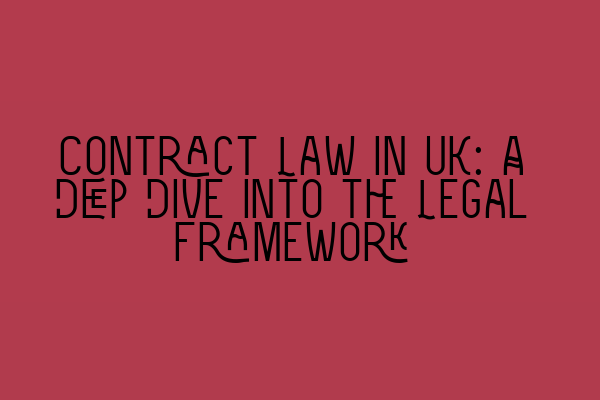Contract Law in UK: A Deep Dive into the Legal Framework
Contract law forms the foundation of business transactions in the United Kingdom. It is a crucial aspect of commercial and personal dealings, providing a legal framework that governs the obligations and rights of parties involved in a contractual agreement. Understanding contract law is essential for solicitors, business professionals, and individuals alike, as it allows for the smooth operation of transactions and ensures legal protection in case of disputes.
In this comprehensive guide, we will explore the key principles, elements, and processes involved in contract law in the UK. Whether you are a student studying for the SQE exams or a legal professional looking to refresh your knowledge, this article will serve as a valuable resource. Let’s dive in!
What is a Contract?
At its core, a contract is a legally binding agreement between two or more parties. It outlines the terms and conditions that the parties have agreed upon and establishes their respective rights and obligations. Contracts can be verbal, written, or implied through the conduct of the parties involved.
The formation of a valid contract requires certain key elements:
- Offer and Acceptance: One party must make a definite offer, and the other party must accept it without any alterations or counteroffers. This process involves a clear indication of intention to be bound by the terms of the agreement.
- Consideration: Both parties must provide something of value (money, goods, services, etc.) in exchange for the promises made in the contract. Consideration is an essential element of a valid contract and ensures that the agreement is not gratuitous.
- Intention to Create Legal Relations: The parties entering into a contract must intend to create legal obligations. In most commercial transactions, this intention is assumed, but in certain social or domestic arrangements, legal intention may be absent.
- Capacity: The parties involved must have the legal capacity to enter into a contract. This means that they must be of sound mind, of legal age, and not under any undue influence or duress.
- Consent: The parties must give their free and genuine consent to enter into the contract. Consent can be vitiated by factors such as fraud, misrepresentation, mistake, or coercion.
- Legality: The contract must be for a legal purpose and cannot involve illegal activities or contra bonos mores (against public policy).
Types of Contracts
Contract law encompasses various types of contracts, each with its unique characteristics and legal requirements. Some common types of contracts include:
- Express Contracts: These contracts are explicitly stated, either orally or in writing. The terms and conditions are clearly defined and agreed upon by the parties.
- Implied Contracts: Implied contracts arise from the conduct of the parties or circumstances surrounding the transaction. While they are not explicitly stated, the actions of the parties indicate their intention to be bound by an agreement.
- Bilateral Contracts: In bilateral contracts, both parties make promises to each other. The contract is formed once the promises are exchanged.
- Unilateral Contracts: Unilateral contracts involve only one party making a promise. The contract comes into effect once the other party performs the requested action.
- Void Contracts: A void contract is invalid from the outset and has no legal effect. It is as if the contract never existed. These contracts often involve illegal activities or lack one or more of the essential elements necessary for formation.
- Voidable Contracts: Voidable contracts are initially valid but can be voided by one or more parties due to certain circumstances, such as misrepresentation, fraud, or undue influence.
Contractual Terms and Remedies
Contractual terms define the rights and obligations of the parties involved in a contract. They can be expressed (specifically stated within the contract) or implied (legally presumed to be present). Terms can be conditions (essential terms), warranties (less important terms), or innominate terms (terms that could vary in their importance).
In case of a breach of contract, the injured party may seek various remedies, including:
- Rescission: Rescission allows the injured party to cancel the contract, returning both parties to their pre-contractual positions.
- Damages: Damages refer to financial compensation awarded to the injured party to cover any losses suffered as a result of the breach.
- Specific Performance: Specific performance is a remedy that requires the breaching party to fulfill their contractual obligations as originally agreed.
- Injunctions: In some cases, a court may issue an injunction to prevent a party from taking a particular action that would harm the other party or interfere with the contractual agreement.
Conclusion
Contract law is an intricate area of law that is essential to understand in various professional and personal contexts. This article has provided a deep dive into the legal framework of contract law in the UK, covering key principles, elements, and types of contracts. It has also touched on contractual terms and available remedies in case of a breach.
For further preparation on contract law and other relevant topics for the SQE exams, we recommend checking out our related articles:
- SQE 1 Practice Exam Questions
- SQE 1 Practice Mocks FLK1 FLK2
- SQE 2 Preparation Courses
- SQE 1 Preparation Courses
- SRA SQE Exam Dates
By immersing yourself in the study of contract law, you can develop a strong foundation in legal principles and enhance your proficiency as a solicitor or legal professional.
